Regents of the University of California v. Bakke, 438 U.S. 265 (1978) was a landmark decision by the Supreme Court of the United States which involved a dispute of whether preferential treatment for minorities can reduce educational opportunities for whites without violating the Constitution. It upheld affirmative action, allowing race to be one of several factors in college admission policy. However, the court ruled that specific racial quotas, such as the 16 out of 100 seats set aside for minority students by the University of California, Davis, School of Medicine were impermissible.
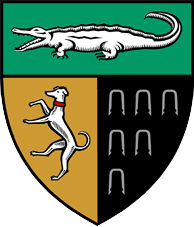
Yale Law School (YLS) is the law school of Yale University, a private research university in New Haven, Connecticut. It was established in 1824 and has been ranked as the best law school in the United States by U.S. News & World Report every year between 1990 and 2022. One of the most selective academic institutions in the world, the 2020–21 acceptance rate was 4%, the lowest of any law school in the United States. Its yield rate of 87% is also consistently the highest of any law school in the United States.

The Georgetown University Law Center is the law school of Georgetown University, a private research university in Washington, D.C., United States. It was established in 1870 and is the largest law school in the United States by enrollment and the most applied to, receiving more full-time applications than any other law school in the country.
Regent University is a private Christian university in Virginia Beach, Virginia. It was founded by Pat Robertson in 1977 as Christian Broadcasting Network University and changed its name to Regent University in 1990. Regent offers traditional on-campus programs as well as distance education. Through its eight academic schools, Regent offers associate, bachelor's, master's, and doctoral degrees in over 70 courses of study. The university is accredited by the Commission on Colleges of the Southern Association of Colleges and Schools with specific programs accredited by other professional or national accreditors.
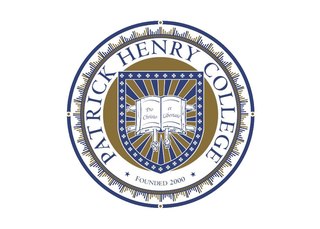
Patrick Henry College (PHC) is a private liberal arts non-denominational conservative Protestant Christian college located in Purcellville, Virginia. Its departments teach classical liberal arts, government, strategic intelligence in national security, economics and business analytics, history, journalism, environmental science and stewardship, and literature. The university has full accreditation from the Commission on Colleges of the Southern Association of Colleges and Schools (SACS-COC) as of 2022. Patrick Henry College continues to be accredited by the Transnational Association of Christian Colleges and Schools (TRACS), which is also recognized as an institutional accreditor by the United States Department of Education. Its graduation rate is 67%.

The University of Michigan Law School is the law school of the University of Michigan, a public research university in Ann Arbor, Michigan. Founded in 1859, the school offers Master of Laws (LLM), Master of Comparative Law (MCL), Juris Doctor (JD), and Doctor of the Science of Law (SJD) degree programs.
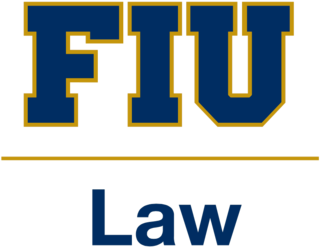
The Florida International University College of Law is the law school of Florida International University, located in Miami, Florida in the United States. The law school is accredited by the American Bar Association, and is the only public law school in South Florida. FIU College of Law is currently the third highest ranked law school in Florida according to U.S. News and World Report.

The Benjamin N. Cardozo School of Law is the law school of Yeshiva University. Located in New York City and founded in 1976, the school is named for Supreme Court Justice Benjamin N. Cardozo. Cardozo graduated its first class in 1979. An LL.M. program was established in 1998. Cardozo is nondenominational and has a secular curriculum, in contrast to some of YU's undergraduate programs. Around 320 students begin the J.D. program per year, of whom about 57% are women. In addition, there are about 60-70 LL.M. students each year. Cardozo was ranked 52nd in the nation by U.S. News & World Report in 2023, but 69th in 2024 due in part to various changes USNWR's calculation of rank.

The University of San Diego School of Law is the law school of the University of San Diego, a private Roman Catholic research university in San Diego, California. Founded in 1954, the law school has held ABA approval since 1961. It joined the Association of American Law Schools (AALS) in 1966.
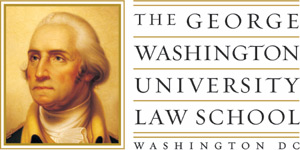
The George Washington University Law School is the law school of George Washington University, in Washington, D.C. Established in 1865, GW Law is the oldest top law school in the national capital. GW Law offers the largest range of courses in the US, with 275 elective courses in business and finance law, environmental law, government procurement law, intellectual property law, international comparative law, litigation and dispute resolution, and national security and U.S. foreign relations law. Admissions are highly selective as the law school receives thousands of applications. In 2020, the acceptance rate was 21%.

The American University Washington College of Law is the law school of American University, a private research university in Washington, D.C. It is located on the western side of Tenley Circle in the Tenleytown section of northwest Washington, D.C. The school is accredited by the American Bar Association and a member of the AALS.

Aloysius Leon Higginbotham Jr. was an American civil rights advocate, historian, presidential adviser, and federal court judge. From 1990 to 1991, he served as chief judge of the United States Court of Appeals for the Third Circuit. Originally nominated to the bench by President Kennedy in 1963, Higginbotham was the seventh African-American Article III judge appointed in the United States, and the first African-American United States district judge of the United States District Court for the Eastern District of Pennsylvania. He was elevated to the Third Circuit in 1977, serving as a federal judge for nearly 30 years in all. In 1995, President Bill Clinton awarded him the Presidential Medal of Freedom. Higginbotham used the name "Leon" informally.
The University of Florida Fredric G. Levin College of Law is the law school of the University of Florida located in Gainesville, Florida. Founded in 1909, it is the oldest operating public law school in Florida, and second oldest overall in the state.
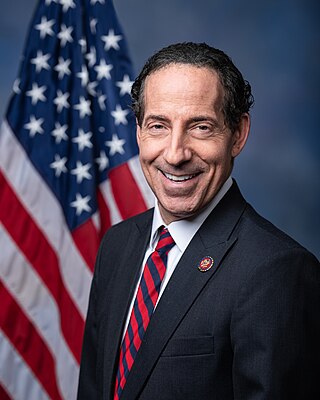
Jamin Ben Raskin is an American attorney, law professor, and politician serving as the U.S. representative for Maryland's 8th congressional district since 2017. A member of the Democratic Party, he served in the Maryland State Senate from 2007 to 2016. The district previously included portions of Montgomery County, a suburban county northwest of Washington, D.C., and extended through rural Frederick County to the Pennsylvania border. Since redistricting in 2022, Raskin's district now encompasses only part of Montgomery County.

David D. Cole is the National Legal Director of the American Civil Liberties Union (ACLU). Before joining the ACLU in July 2016, Cole was the Hon. George J. Mitchell Professor in Law and Public Policy at the Georgetown University Law Center from March 2014 through December 2016. He has published in various legal fields including constitutional law, national security, criminal justice, civil rights, and law and literature. Cole has litigated several significant First Amendment cases in the Supreme Court of the United States, as well a number of influential cases concerning civil rights and national security. He is also a legal correspondent to several mainstream media outlets and publications.
Michael Edward Tigar is an American criminal defense attorney known for representing controversial clients, a human rights activist and a scholar and law teacher. Tigar is an emeritus (retired) member of the Duke Law School and American University, Washington College of Law faculties. He was on the faculty of the University of Texas School of Law from 1983-1998, serving as the Joseph D. Jamail Centennial Chair in Law for much of that time.
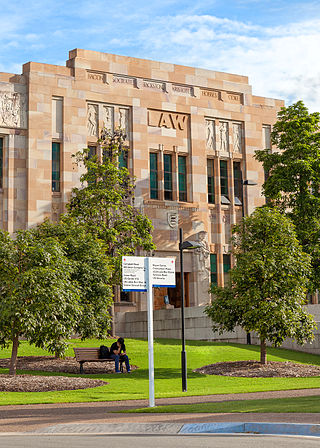
The UQ Law School is the law school of the University of Queensland in Brisbane, Australia. Founded in 1936, the school is the sixth-oldest law school in Australia and the oldest and most prestigious in Queensland. The school is currently the most-cited law school in Australia. Its alumni include six Australian High Court Justices including two Chief Justices of Australia.
Jamil Jivani is a Canadian radio host and non-practising lawyer. In 2020, he was appointed senior fellow for Diversity and Empowerment at the Macdonald-Laurier Institute, a conservative, libertarian think tank affiliated with the US Atlas Network. His association with the Institute ended in 2022. He sits on the Premier's Council on Equality of Opportunity and is the Advocate for Community Opportunities for the Doug Ford government. In July 2020, Jivani faced backlash for disparaging remarks he made about calls on Twitter to defund police, and for blaming some of the increase in gun violence on “young gangsters” and their online drama. He is the founder of the Policing Literacy Initiative, co-founder of Teachers Beyond the Classroom, and a 2014-15 articling student at Torys LLP.
Hernandez Stroud is a counsel for the Justice Program at the Brennan Center for Justice at New York University School of Law. An expert on prisons and jails and constitutional law, he researches and drafts criminal justice policy reforms at the federal level; he also studies federal judicial intervention into state prisons and local jails. He serves as an adjunct assistant professor at Columbia University and the New York University School of Law. He is also an affiliated fellow at Yale Law School.
Stephen J. Wermiel is an American legal scholar, historian, and professor of law at American University Washington College of Law specializing in First Amendment law and the history of the United States Supreme Court. Wermiel has written several biographical books about Supreme Court Justice William J. Brennan, Jr. Alongside Jamie Raskin, Wermiel co-founded the Marshall-Brennan Constitutional Literacy Project.












